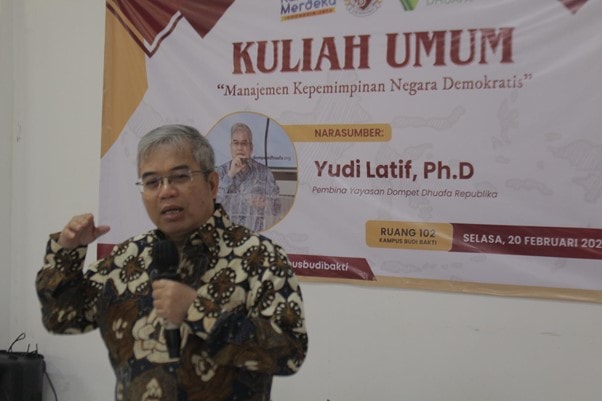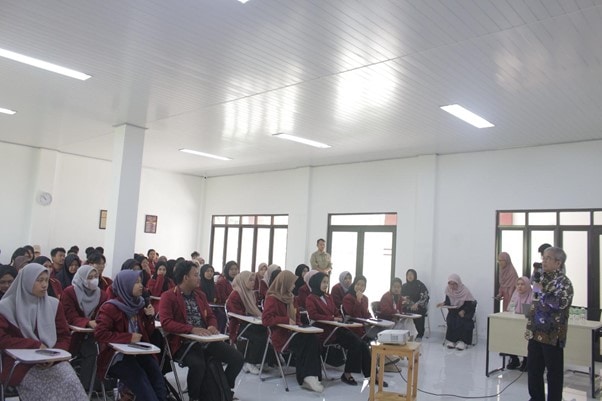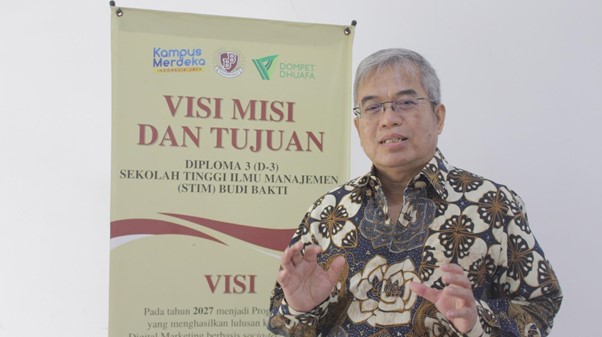BOGOR, WEST JAVA – The idea of democracy is an idea that emphasizes that the government is run by the will of the people. In the sense that in a democratic country, sovereignty as the supreme power is in the hands of the people.
The supreme power in the hands of the people can include the political field or the economic field. If the power is related to the economic field, then the power system is called economic democracy. The constitutional foundation of economic democracy is contained in Article 33 of the 1945 Constitution.
Sekolah Tinggi Ilmu Manajemen (STIM) Budi Bakti Bogor presented Prof. Yudi Latif in a public lecture entitled “Leadership Management of Democratic Countries”, on Tuesday (20/2/2024). In his dialogue with STIM Budi Bakti Campus students, Prof. Yudi began his presentation by inviting students to explore the basics of democracy and its goals.
“The civilization of a nation state can take place well if the political governance of democracy runs well, the economic governance is fair, and the governance of character values is well formed,” said Yudi.

Prof. Yudi Latif revealed that Indonesia is currently experiencing a colonized economy. As Soekarno said, this is reflected in the tendency of people to buy goods at high prices.
“The characteristic is that people buy goods as expensive as possible, then producers sell goods as cheaply as possible,” said Prof. Yudi Latif.
Economic democracy actually prioritizes the prosperity of society, not just the benefits of certain groups. In other words, in this system, the prosperity and position of the people are placed as the main focus and have a substantial central position.
Read aslo: Yudi Latif on the Value and Innovation of Entrepreneurship in Dompet Dhuafa’s Endeavors
Furthermore, the Dompet Dhuafa Foundation Trustee also emphasized that democratic governance plays a key role in shaping value, character and economic governance. In his view, democracy is not only a political system, but an integral foundation that affects various aspects of people’s lives. Therefore, maintaining good democratic governance is the main foundation for building a society of integrity and a sustainable economy.
“Seeking political-economic governance for welfare is the key to good political management. Politics is not power for power’s sake, not election for election’s sake. However, politics has the task of social transformation of society. Democratic politics has the task of maintaining the diversity of Indonesia’s national unity. However, if democracy only benefits a handful of rich people, there will be turmoil in society,” he continued.

From the time of President Soekarno to 25 years after reformasi today, Indonesia faces a democratic reality that reflects postcolonial economic inequality. This economic inequality has not only persisted. In fact, the gap has increased after reformasi.
Read also: New Management Structure: Efforts for Dompet Dhuafa to Become a Resilient and Adaptive Organization
“Democracy makes economic disparities widen, unity is increasingly stretched. One example of how the state’s partiality is in making laws related to the interests of the people will be discussed for a very long time, while laws that are of interest to the business of a handful of rich people in power will be discussed and passed more quickly,” added Prof. Yudi Latif.
Finally, Prof. Yudi advised on leadership and sustainability. The sustainability of government or state programs should be institutionalized not by the continuation of leadership from blood relations. (Dompet Dhuafa)
Text & Photo: Budi Bakti Campus & Anndini Dwi Putri
Editor: Dhika Prabowo



